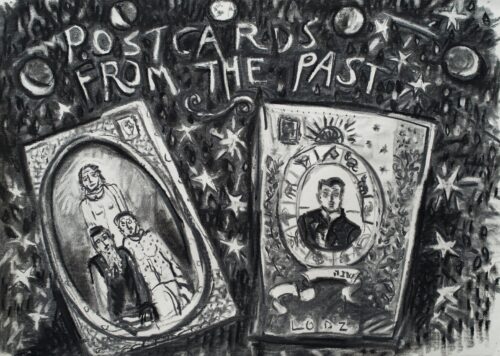Postcards
Wednesday, July 24 | 1:30 pm

About the Performance
"This performance takes a trip through time, with a young woman in St. Petersburg, Russia during the Russian revolution, and a young man in Lodz, Poland. From the invasion of Poland, inside the Lodz ghetto, immigration to Toronto and New York City, and a joyful marriage. How did they meet? What secrets were never told? We will never know but perhaps we can imagine. There were dreams of youth, tragedy, war, and finally love.
I have created a series of charcoal drawings and paintings highlighting real and imagined events from my grandparent’s lives, inspired by messages found on old family postcards, only recently translated. Enhanced by old photographs and the postcards themselves, images will be projected during the live performance.
There were very few stories told in our family. I did know that my grandmother studied in a gymnasium in St. Petersburg. She was 16 during the Russian revolution, before emigrating to the United States through Ellis Island between the wars. I also knew stories of my grandfather’s journey from Poland to Antwerp, to Halifax, then Toronto at the age of 16, in 1921.
In an old photograph album with black paper pages there were many old photographs, some with names attached some without. When we removed the photographs from the album, we discovered that many were actually postcards. Some with names and dates, addresses, and postmarks. There were postcards from 1914-1916 written in Russian, addressed to my grandmother, and postcards from the 1940s written in Yiddish, addressed to my grandfather.
Some of the postcards have family photos, portraits in studios, and some are generic images of towns where we assume the sender lived or visited. But what did they say, I wondered.
Just last year I had the Russian postcards translated by a refugee from the war in Ukraine and the Yiddish postcards translated by Miriam Borden, at the University of Toronto.
There were surprises, and even more questions. I discovered names I had never heard before. Many of the postcards written to my grandmother in the early 1900s, were from Zlata who seems to have been a childhood friend from my grandmother’s village of Chernigov, Russia written from America. In one she writes to congratulate my grandmother, Ruchel, on her recent marriage and asking for news from the village.
But wait, this was 15 years before she met my grandfather, and married him in New York City. And, who were the men who wrote love letters to her? One man said he would now have to wander the streets alone. Another, a soldier who wanted to be remembered to everyone back home.
The postcards from the 1930s, and 1940s from Lodz, Poland, from my grandfather’s family, tell us that life is very hard for them now. What happened to my grandfather’s parents, his siblings,and the rest of the extended family? My grandfather never knew. Sadly, we know everyone who survived the Lodz Ghetto were sent on trains to Chemlo, where they were murdered. There is no record.
We also discover something happy. A photograph of the one nephew, Zalman, who survived the concentration camps, writes from a displaced persons camp in Southern Italy to say he is alive and is now married to another survivor. My grandfather sponsored them to come to Canada. I remember them.
Maia Sutnik, photography curator at the AGO, told me when I show her the postcards that I will likely never know the answers to my questions, and she is right. But she says as an artist I can imagine what might have happened, and most importantly tell that story through my art.
One day I mentioned the postcards to James Campbell and told him the story. He said, here is something to create a program around, a personal experience, one in a series of “Painted Sounds” concerts with projected images that we have created together over the years. He introduced me to Daniel Vnukowski. Together the music was selected from the period, some by forgotten or erased Jewish composers. Film maker Jerry McIntosh collaborated in creating a visual narrative of my images and the postcards to be projected during the performance of Postcards From The Past." -Alan Stein
Jerry McIntosh, video design and editing
Alan Stein, RCA, visual artist, overall concept and design
Daniel Vnukowski, music director and pianist
Andrea Ludwig, mezzo-soprano
Jaclyn Grossman, soprano
James Campbell, clarinet
Moshe Hammer, violin
PART ONE - PAST
Kurt Weill: Youkali
Srul Irving Glick: Klezmers Wedding
“Shulf Mayn Kind”
Yiddish Lullaby: Warshawsky, “Oyn Pripechik”
PART TWO - LOST, WAR
Lori Laitman: I Never Saw Another Butterfly
Ernst Bloch: Nigun from "Baal Shem"
Weinberg: Sonata Op 28 lll.
Adagio
PART THREE - LOVE, SURVIVAL, HOPE
Fritz Kreisler: Slavonic Fantasy on themes of Dvorak
Graham Campbell: Dancing With Strangers
Arnold Schoenberg: Gigerlette
Felix Mendelssohn: On The Wings Of Song